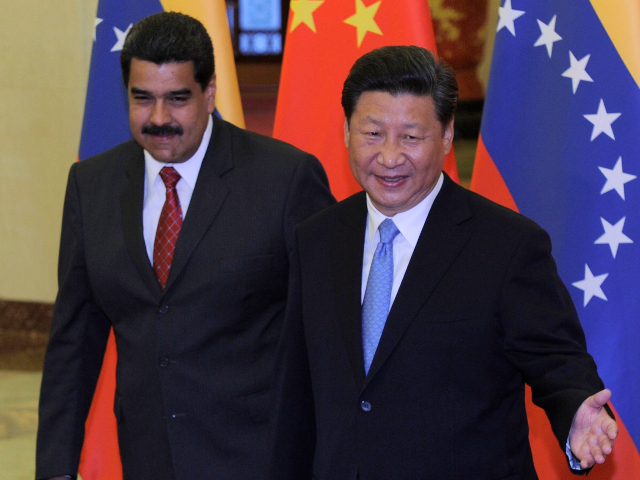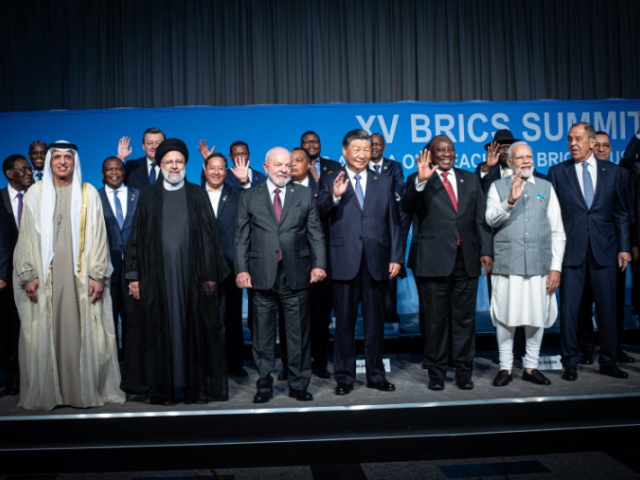Venezuelan socialist dictator Nicolás Maduro arrived in China over the weekend as part of a six-day tour in the Asian nation. Maduro seeks to obtain renewed engagement and financing from the Chinese Communist Party and to garner support for Venezuela’s bid to join the China-led BRICS economic and security bloc.
The socialist dictator, who is aiming to “diversify” Venezuela’s ailing economy with China’s help, is expected to meet with Chinese dictator Xi Jinping later this week.

Chinese President Xi Jinping meets with Venezuela’s President Nicolas Maduro at the Great Hall of the People on September 1, 2015, in Beijing, China. Maduro is visiting China seeking financial assistance as Venezuela has been hit hard by recession (Photo by Parker Song-Pool/Getty Images).
Maduro’s six-day stay in China, organized at Xi’s invitation, marks the first time the socialist dictator has visited the Asian nation since September 2018. It is part of a broader international tour that will see Maduro travel to other, so far undisclosed, “friendly” countries.
“Good morning Venezuela! We arrived in Shenzhen, a city in the People’s Republic of China, ready for what will be a historic visit for the strengthening of cooperation ties and the construction of a new world geopolitics,” Maduro posted on Twitter upon his arrival to China on Friday.
“Stay tuned! Good news will rain down for the Venezuelan people,” Maduro wrote.
In an interview given to the Chinese state-run Xinhua news agency on Saturday, Maduro said he wants China’s support for Venezuela’s bid to join BRICS, claiming that the relationship between both countries can serve to strengthen the China-led bloc:
#EnVivo 📹 | Entrevista con la Agencia de Noticias Xinhua, de China. https://t.co/52YY4Yb0zF
— Nicolás Maduro (@NicolasMaduro) September 10, 2023
“I think that the BRICS is a group that is getting stronger,” Maduro said. “We could classify the enlarged BRICS group as the great engine for the acceleration of the process of the birth of a new world, a world based on cooperation where the ‘Global South‘ has the primordial voice, a world without hegemony, a world without colonialism and imperialism.”
Maduro also told Xinhua that it is necessary to “strengthen the relationship between China, Latin America and the Caribbean” and that the United Nations needs to be “re-founded” to achieve a new world economic order. He added that China and Venezuela are “close friends” with “a common destiny in the world to come.”
“The world of the future will be a world of a basket of currencies, it will not be the world of a single currency,” he continued. “The BRICS accelerate the de-dollarization of the world, the emergence of a new international financial system, of a new just economic order.”
Venezuela’s socialist regime, much like the communist Castro regime in Cuba and the Sandinista Ortega regime in Nicaragua, is actively seeking to join BRICS.
In August, Maduro offered both Venezuela’s oil reserves and farmland to the coalition as part of his bid to get an eventual offer to join. BRICS announced its expansion with the inclusion of six new countries to take effect in January 2024: Argentina, Egypt, Ethiopia, Iran, Saudi Arabia, and the United Arab Emirates.

JOHANNESBURG, SOUTH AFRICA – AUGUST 24: South African President Cyril Ramaphosa with fellow BRICS leaders pose for a family photo with new BRICS members on the last day of the BRICS summit (Per-Anders Pettersson/Getty Images).
Venezuela holds the world’s largest proven oil reserves, estimated at more than 300 billion barrels. However, oil production dramatically plummeted in recent years after more than two decades of socialist mismanagement left Venezuela’s oil industry in a near-ruined state.
Shortly before Maduro’s arrival in China, a delegation led by Venezuelan Vice President Delcy Rodriguez and Oil Minister Pedro Tellechea arrived in Shanghai last week, seeking Chinese investment to renovate Venezuela’s crumbling oil industry.
As part of Maduro’s agenda in China, both countries signed a Memorandum of Understanding over the weekend that will see China aid the Maduro regime in the development of “Special Economic Zones” that Maduro wants to build in Venezuela, in a similar manner to what China has done in some of its cities such as Shanghai, Tianjin, and Shenzhen.
Venezuela reportedly still owes some $10 billion to China in oil-for-loan deals. China remains one of the Maduro regime’s biggest financiers, while late socialist dictator Hugo Chávez borrowed more than $50 billion from China during his rule (1999-2013).
According to reports published in April, China stopped lending money to Venezuela in 2016, noting “deteriorating economic conditions” as a result of the collapse of socialism in Venezuela that began over a decade ago. Maduro had negotiated a one-year grace period with China in 2016.
China has also reportedly been helping the Maduro regime avoid U.S. sanctions, imposed by the administration of former President Donald Trump on the state-owned Petróleos de Venezuela (PDVSA) company in 2019, by shipping millions of barrels of oil through Chinese state-owned defense firm vessels since 2020.
China’s aid was instrumental in the Maduro regime’s design and deployment of the “Fatherland Platform,” a system heavily based on China’s social credit system. The Maduro regime uses this system to amass large quantities of citizens’ data and to control and distribute a wide array of “bonuses,” such as subsidized gasoline rations, food handouts, monetary stipends, and other government social programs.


